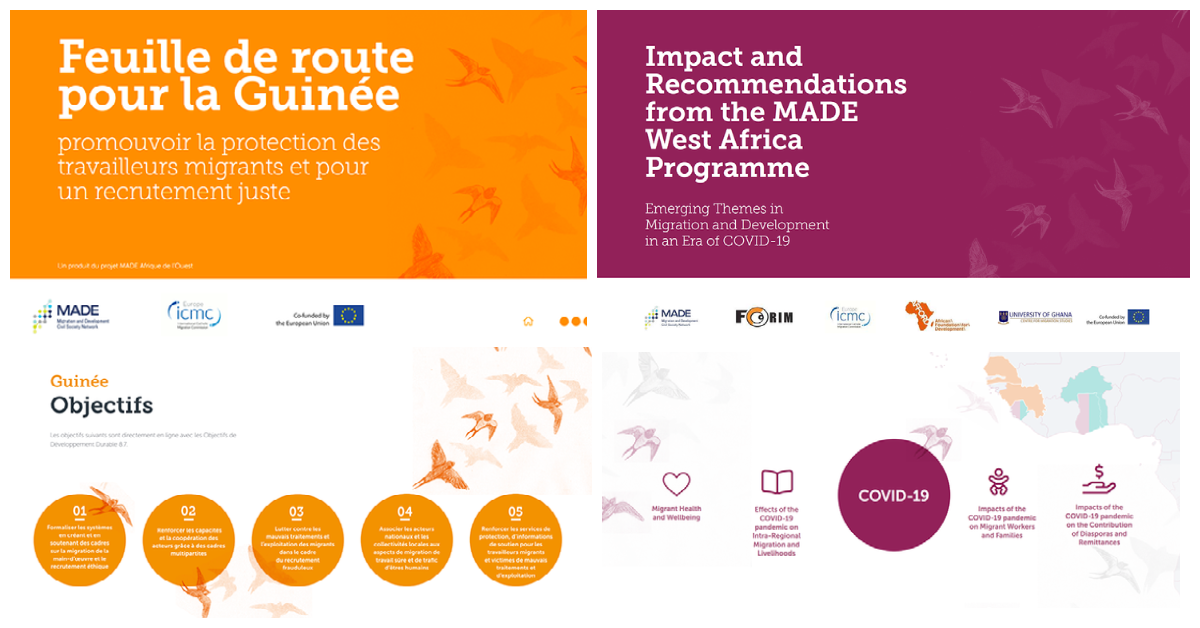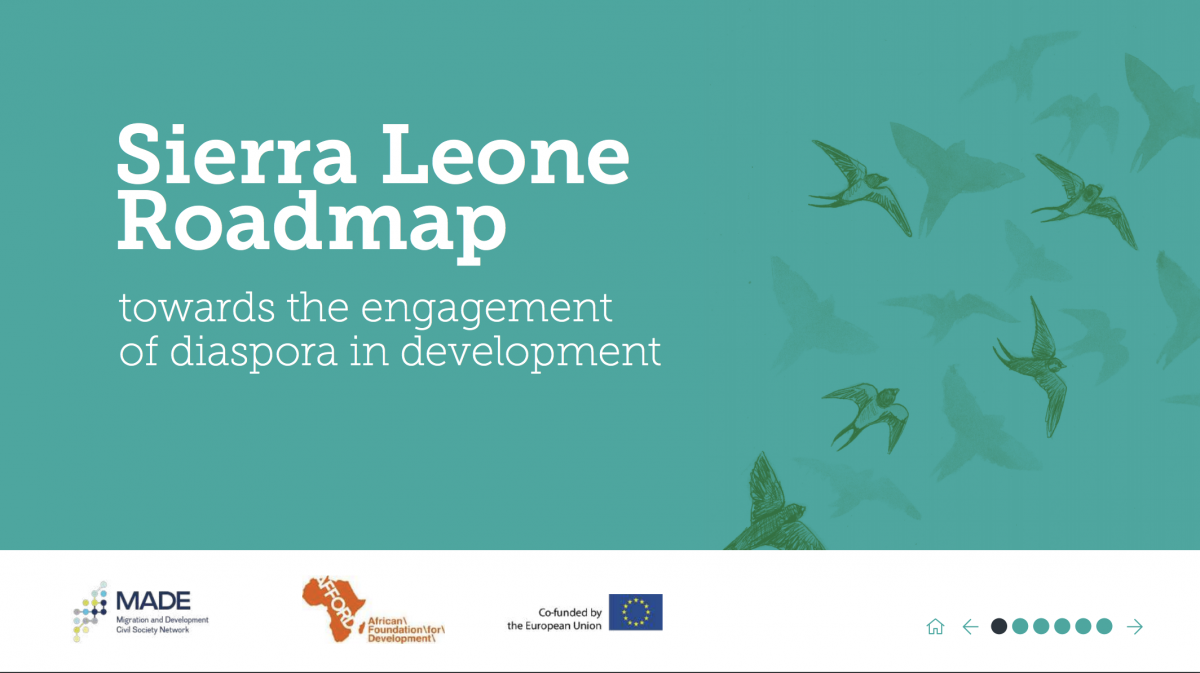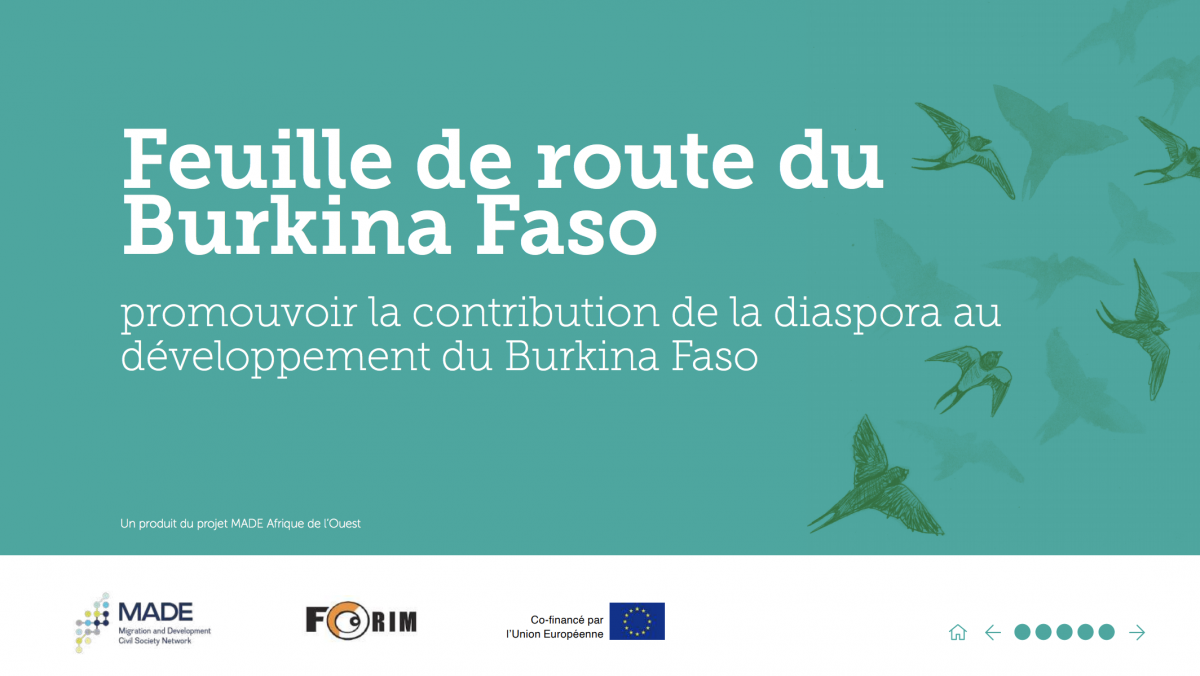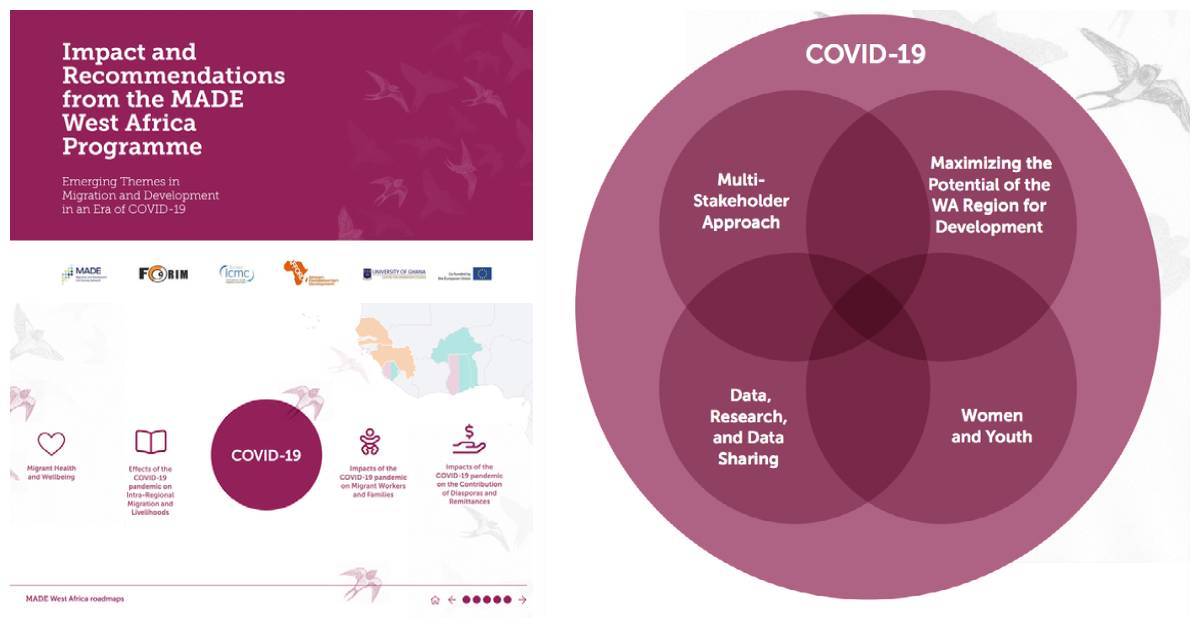COUNTRY ROADMAPS

During the course of the MADE West Africa program, the partners developed a multi-stakeholder, multi-governance approach in order to maximise the positive contribution of human mobility to the development of the ECOWAS area. The roadmaps are a product of research, mapping, seed funding, and the multi-stakeholder dialogues held between 2017 - early 2020, which outline specific and realistic commitments for parties that were present at the multi-stakeholder meetings. Therefore, ownership of the project outcomes is not only to the project partners but also to the various actors who participated in the project.
As the final product of the project, the roadmaps also represent a culmination of the project's activities including: topic specific research, in-country trainings focused on capacity building, multi-stakeholder meetings, and seed funds.
Following the COVID-19 outbreak, a supplementary document has been created (English and French versions available) to provide an overarching synthesis of findings and suggestions in light of the pandemic (see below).
Format
Each of our 8 roadmaps include specific, contextual information related to each country in each of our 3 topic areas. Most importantely, they identify 5-6 key objectives in working towards the collective goal. The objectives in each roadmap provide a framework of existing stepping stones and recommendations for future interventions, each delineating specific actors to be involved. Therefore, the roadmaps acknowledge the previous or current progress in each area that can be built upon or leaned on for supporting future actions.
The next steps defined are supplemented by good practice examples for modeling interventions in the region, some of which have already been implemented by our 5 seed fund recipient organisations. The objectives set by the roadmap and the timeline for their implementation go beyond the implementation of the project, indicating specific and realistic short, medium and long-term commitments for each participant to work towards. Progress accomplished by actions will be evaluated in light of the relevant migration-related targets and indicators.
Participant Ownership
Each of our 8 roadmaps outline clear and concrete steps to achieve goals identified and agreed upon by participants at various multi-stakeholder events. Overall, the participants of the activities represented over 12 sectors including civil society including:

- Academia,
- Diaspora organisations (in and outside West Africa),
- Diplomatic bodies (EU actors, Embassy, Delegations),
- NGOs,
- International organisations (multilateral, foundations),
- Law enforcement, border security,
- Media,
- National Authorities, Government, Ministries,
- Private sector,
- Regional/local authorities Government, Ministries, Community leaders, and
- Religious institutions and leaders.
Therefore, the target groups at the core of the project have ownership over the direction and future steps necessary to achieve the recommendations in the roadmaps.
PROMOTING INTRA-REGIONAL MIGRATION FOR DEVELOPMENT


Ghana key objectives: Enhance awareness about the ECOWAS Protocol on Free Movement among Member States and stakeholders; Produce reliable, up to date, disaggregated data for policy and planning; Harmonise national laws with that of ECOWAS; Protect Migrants’ rights and enhance protection from Human trafficking and exploitation; Enhance mutual co-existence of migrants and host communities
Click
here to read the full Ghana Roadmap on intra-regional migration by CMS.
Sierra Leone key objectives: Facilitate free movement among Member States and stakeholders as a tool for the development of the region; Protect migrants against harassment and abuse of human rights at border points; Produce reliable, timely, disaggregated data for policy and planning; Harmonise national laws with that of ECOWAS protocols; Facilitate free movement through effective border management
Click
here to read the full Sierra Leone Roadmap on intra-regional migration by CMS.
PROTECTING MIGRANT WORKERS' RIGHTS


Guinea key objectives: Formalise systems by creating and supporting frameworks on labour migration and ethical recruitment; Build capacity and cooperation of actors through multi-stakeholder frameworks to implement and support interventions; Combat abuse and exploitation of migrants linked to fraudulent recruitment; Engage national actors and local communities on aspects of safe labour migration and human trafficking; and Strengthen protection, information and support services for labor migrants and victims of abuse and exploitation
Click
here to read the full Guinea Roadmap on promoting the protection of migrant workers as well as their fair recruitment by ICMC Europe (in French!).
Senegal key objectives: Create and support frameworks on labour migration and fair and ethical recruitment; Scale-up collaborative, coordinated implementation through multi-stakeholder frameworks to implement and support interventions; Interventions beyond the national level: Decentralisation and West African focus; Combat abuse and exploitation of migrants linked to fraudulent recruitment; and Strengthen protection and support services for labor migrants and victims of abuse and exploitation, especially women and children
Click
here to read the full Senegal Roadmap on promoting the protection of migrant workers as well as their fair recruitment ICMC Europe (in French!).
ENGAGEMENT OF DIASPORA IN DEVELOPMENT


Ghana key objectives: Multi-Stakeholder Approach (promoting local authority participation and a diaspora dimension linking to South-South collaboration); Towards promoting policy development and engagement; Advocacy and Policy Influencing; Reducing the cost of remittances; Remittance match funds and investment platforms; Developing business networks for capacity building and skills transfer
Click
here to read the full Ghana Roadmap on the engagement of diaspora in development by AFFORD.
Sierra Leone key objectives: Multi-Stakeholder Approach (promoting local authority participation and a diaspora dimension linking to South-South collaboration); Towards promoting policy development and engagement; Advocacy and Policy Influencing; Reducing the cost of remittances; Remittance match funds and investment platforms; Developing business networks for capacity building and skills transfer
Click
here to read the full Sierra Leone Roadmap on the engagement of diaspora in development by AFFORD.


Burkina Faso key objectives: Improve the institutional governance of the mobilization of the diaspora; Facilitate administrative procedures for diaspora projects; Encourage the creation of businesses and productive diaspora investments; Ensure adequate return of Burkinabè residing abroad; Strengthen development projects led by the diaspora
Click
here to read the full Burkina Faso Roadmap on the engagement of diaspora in development by FORIM (
in French!).
Togo key objectives: Continuation of the dynamic structuring of the Togolese diaspora; Institutional strengthening of diaspora issues at the level of the Togolese authorities; Mobilization of additional human and financial resources; Deepening of partnerships and multi-actor cooperation; Increase the visibility of actions carried out by the diaspora and their capitalization
Click
here to read the full Togo Roadmap on the engagement of diaspora in development by FORIM (
in French!).
COVID-19
The MADE WA partners know that the steps outlined in the roadmaps will occur during or post-covid-19 pandemic, even if the recommendations were agreed upon prior to the onset. While the crisis will surely impact implemention, in many ways the pandemic has only highlighted or exacerbated what we already aimed to overcome. In this way the importance of human mobility, migration protection, and development continute to prove vital in providing solutions to global issues, of which covid 19 is no exception.
Therefore, it is evident that the shared lessons learned across each topic of our project are key to overcoming covid 19 and its effects. Our supplementary “9th roadmap” outlines 4 cross-cutting synergies from each of our activities and experiences with recommendations that will be integral in migration and development moving forward from covid-19 including:
● Multi-stakeholder approach
● Maximizing the Potential of the WA Region for Development
● Data, research, and data sharing
● Women and youth
This document will apply to each individual roadmap and also provide guidance to other projects now and in the future.

Click here to read it in English. Click here to read it in French.


